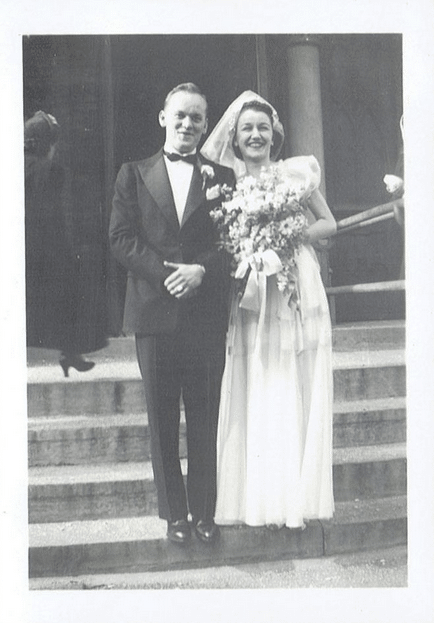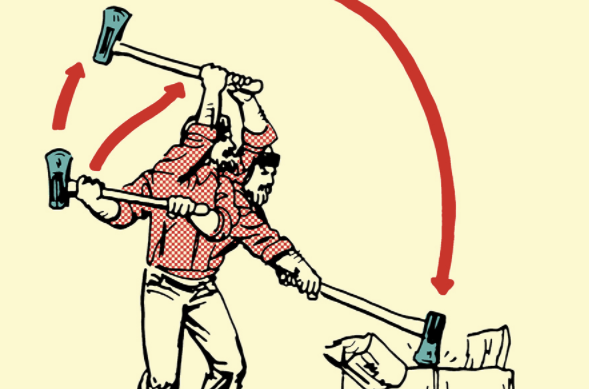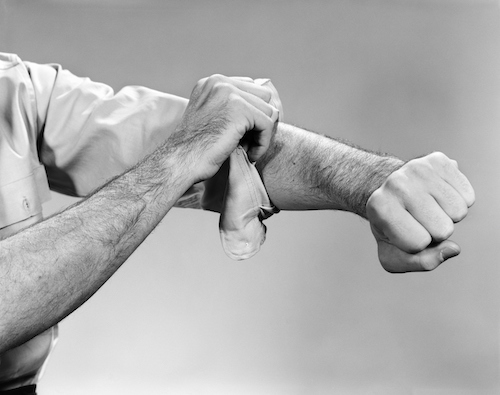
Relatively speaking, grooms have it easy. It’s not our family that is traditionally responsible for budgeting or planning the wedding. And it’s the bride who’s usually much more interested and invested in how the whole shindig turns out. As the old cliché has it, the groom’s only responsibility is to show up on time. While that is indeed important, even the grooms of yesteryear were in fact responsible for more than being punctual. And the modern groom usually wants to be at least semi-involved with planning the big day too.
While you may not concern yourself with the flower arrangements, there are tasks before the wedding, during the big day itself, and afterwards that you are able, and expected, to take on. Let’s explore them in full with this comprehensive guide!
Planning Phase
Take Initiative to Make the Bride’s Life Easier
Your fiancée, from nearly the moment you put a ring on her finger, will likely be quite stressed out by wedding planning. Whether you agree with the reasons behind that stress doesn’t matter; your job is to mitigate it the best you can. If there’s anything on the following list that you can take charge of, do it. Don’t leave your bride-to-be with all the details, even if she “lets” you. Be involved, take initiative, and ensure that your engagement is a time of love, joy, and reflection rather than stressful fighting because you aren’t doing your part.
Speak Up About What Matters To You
There a few things that are generally given to the groom to handle. We’ll get to those later. There are also things that generally the bride takes care of, and of course things that you work on together. In any phase of planning, you have to be sure to speak up when something is important to you. If she doesn’t care about you seeing her dress, but you’d prefer to wait until the big day, it’s your job to make that known. If there are details about the menu that you care about, step in and voice your opinion. While the cliché is that weddings are for brides and not for grooms, it’s half your party, and half your marriage, and you deserve to be heard when it’s something that matters to you.
Cede What Isn’t Important, But Have Input If Requested
For the average guy, there will be many parts of wedding planning that he simply doesn’t have an opinion on. From bridesmaid outfits, to invitations, to ceremony decor/themes/colors, to photographers, there are a number of things that brides typically handle themselves (along with a planner or mother). For many of these, you’re allowed to stay out of the way and just let things happen. Should you be asked for help, or for your input though, you should give it.
The hard part here, oftentimes, is actually having an opinion. There were a few instances in the planning of my wedding where my bride asked for input, only to hear me say, “I have no preference, do whatever you want.” In my mind this was the right thing to say — let her take charge! But that wasn’t what she wanted — she truly wanted an opinion from her groom. A lady is faced with so many choices it can be rather overwhelming, and sometimes she just needs a simple vote to push her to one side of a decision or another. So give her peace of mind by picking whatever option you feel a slight preference for, while acting as if you feel quite decided on the matter.
Logistics That Should Be Decided Jointly
There are certain wedding logistics you and your fiancée should decide on together. These include:
- Date of wedding.
- Location. This is most often the bride’s hometown. Not much you can do about that. You might also jointly decide on a destination wedding.
- Budget. Traditionally, the bride’s family pays for wedding festivities. That’s slowly changing, but it’s still often the case, especially with younger couples who don’t have the scratch for a nice event. If costs are taken on primarily by one side of the family, they’ll understandably have more say in wedding decisions. If parents are splitting costs, they’ll both be given some weight in decision making. And if you’re paying as a couple, you’ll have the lead with decisions (but parents should often be given some say just out of respect).
- Ceremony details.
- Religious preferences
- Music
- Readings
- Vows
- Guest list. This is one of the hardest parts of planning any wedding, and an entire article could be written about it alone. Know that the guest list is a high stress point in the planning phase. You’ll not only perhaps clash with each other in deciding who makes the cut or not, but you’ll be dealing with parents’ wishes as well. They often want family friends invited who you may not know very well, but played an important role nonetheless in raising you. Just do your best to balance everyone’s wishes.
- Registering. One of the most fun parts of wedding planning! You get to walk around stores with a scanner gun and just shoot whatever you want. She gets to pick out dishes and cutlery, so make sure you get yourself some power tools and camping gear.
- Accommodations for out-of-towners. This can be handled by either the bride or groom. If your fiancée is overwhelmed, volunteer to take it on.
What You’ll Typically Have Responsibility For (Either Alone or Shared)
Below you’ll find a list of duties that the groom is typically responsible for coordinating and planning. As with any wedding-related decision, always discuss it with the bride first, unless you’ve expressly chosen otherwise as a couple (as with the honeymoon, perhaps). With many of these, decisions may in fact be made jointly, but you’ll be the one actually booking, coordinating, and executing things.
Choosing the groomsmen and ushers. After choosing as a couple how many bridesmaids/groomsmen you’ll have (generally led by how many the bride would like on her side), you’ll pick the fellas that’ll stand by your side as you say your vows. Friends, siblings, and cousins are all common selections here. Just be wise in choosing your best man; you want someone fun, but also responsible, as he has a number of important duties as well. One additional note here is that you should usually include the bride’s brother(s) if she has any.
Ushers will also likely be your choice, as they’re most often men. Be conscientious of the bride’s male relatives here as well.
Clothing yourself and your groomsmen. While what you actually wear will likely be a joint decision with your bride, you’ll be the one procuring the gentlemen’s measurements and outfits. This always ends up being one of the trickier tasks, as you have to coordinate a bunch of sizings, appointments to try things on, etc., often with guys who aren’t in the same town. Get ahead of the ball with this one, and don’t wait until the last minute. You don’t want to be stuck with mismatched or ill-fitting tuxes or suits (unless you’re a hipster, of course, and that’s what you’re going for).
Finding a DJ or band. As a couple you’ll probably discuss which types of songs you like, as well as first dances, including mother/father dances. After that, it’s likely up to you to book a DJ or band. If it’s a band, use extra caution, and be sure to show your bride tapes and demos of their work. DJs are a little safer, as they can usually play whatever you request. You might be tempted to go on the cheap and hire a friend with an iPod, but this is quite risky. You don’t realize how important flow and song selection are until you’re in a situation where there is none. Tread carefully with that route.
Honeymoon. While many couples still go the route of having the groom plan the honeymoon in its entirety as a surprise, in today’s modern world more brides than not want to be involved in the planning. No matter the case, you should take the lead on this one. This is a great chance for you to work on your negotiating skills — call up hotels and rental car companies, let them know you’re booking for your honeymoon, and you’re likely to get special discounts and/or upgrades.
Rehearsal dinner. The dinner on the night before the wedding is typically a monetary responsibility of the groom’s family. It generally takes place after the rehearsal, and guests include relatives, the wedding party, non-relatives involved in the wedding (officiant, musicians, etc.), and any others your families decide to invite. The size and location (I’ve seen everywhere from Hooters to picnics to nice Italian restaurants) will be a joint decision, but with your family taking the lead.
Transportation. You’ll be tasked with arranging transportation for the wedding party, primarily from the ceremony to the reception. This often takes the form of a party bus or limousine, of which there are a zillion companies to choose from. You’ll also want transportation for you and your bride from the reception to your home, hotel, or even airport. This is often just your own vehicle, but some folks want something special.
Arranging the marriage license. This is a detail that I’ve seen forgotten multiple times. States are vastly different in how they issue marriage licenses. A few generalities though:
- You’ll both need valid IDs to prove your identity, as well as verify your age, which varies by state.
- You’ll need to go to some sort of government office to apply for your license, often a county clerk. In some states both parties must be present; in some the bride need not be.
- You’ll need a licensed officiant — either a clergyman or judge — to wed you. After this happens, you’ll both sign your marriage license, making it official in the eyes of the state. There are a few exceptions, and some states allow you to self-marry — that is, no clergy or judge needed. You just declare yourself wed, and boom! it’s done. Again, carefully consult your state and county’s specific marriage laws.
Making your wishes known about the bachelor party. While the best man will do the planning of the bachelor party, you’ll probably be involved. This is where choosing a responsible best man comes in handy. If you let him know your wishes, he’ll most likely follow suit and you’ll end up with a fun and memorable evening. You can be specific, saying where you’d like to eat, exactly what you’d like to do, etc. Or you can be general, telling him that you want to go somewhere classy for cocktails, followed by a steakhouse for dinner, and a cigar bar to top it off. If you’re brave, you’ll let the best man take care of everything without your input. Don’t say I didn’t warn you.
On the Wedding Day
Be Present (Stay Sober)
This is without a doubt one of the most important, meaningful, memorable days of your life. The more present you are, the better it will be. Keep drinking to a minimum; my recommendation is to know your limit of how much you can have before getting tipsy, and stay under that number. Keep your phone handy, but only for wedding purposes; stay off ESPN and social media. Wake up early and be involved in the whole process — make the day as long as you can because you’ll relish every minute of it later. Eat a good breakfast to keep butterflies at bay. Show up on time to each and every event. Do everything you can to make sure you’re fully present.
Be Aware of, and Create, Meaningful Moments
This relates to the point of being present, but also goes beyond that. Your wedding will be ripe with meaningful moments — as the groom, you’ll want to be aware of those, and also cognizant in creating some. Whether it’s the private “first look” (a new-ish trend of the bride and groom seeing each other for the first time, before the ceremony, for the sake of getting photos done), your “last meal” as a bachelor, a final conversation with your siblings or father or best man about what this day means to you, take advantage of these one-of-a-kind moments.
Give the Bride a Gift
Many couples want to have a private moment before the ceremony to exchange personal wedding gifts. Some couples forego this, as it’s obviously an extra expense. But it’s a nice touch on the day of, and ensures that you and your fiancée have a little bit of time just the two of you to create a special memory (see above). Jewelry is customary to give — something nice, but not too flashy or expensive. A pearl necklace or bracelet is a great option, in my opinion.
Rings
Your bride will obviously have her engagement ring, but you’re responsible for the wedding bands. At some point in the day, you’ll hand them off to your best man, who will present them to you during the ceremony. The closer to the ceremony, and the fewer times the rings change hands, the better.
Tipping
It’s customary to tip a number of vendors on your wedding day. Everyone from wedding planners, to DJs, to florists, to photographers and bartenders. Gratuity is often built into the contract, so be sure to double check that you aren’t double tipping. If it’s not, you can ask that it be included to save the hassle.
De-Stress the Bride if Anything Goes Off-Plan
Chances are good that something will go a little bit off-plan during the big day. Whether something big or small, you’ll be at least partially tasked with de-stressing your bride, along with probably her mom and bridesmaids. You’ll have to read each situation as it comes, but remind her that at the end of the day, no matter what happens between now and then, you’ll be husband and wife. That’s what matters most, even in the face of an imperfect day — and in the end, you’ll remember it as perfect anyway!
Give Thank You Gifts to the Groomsmen
It’s customary for the groom to give gifts to each of his groomsmen as a thank you for being part of the big day. How much to spend really depends on your budget and station in life. If you’re just out of college, $30-$50 on each is just fine. If you’re a little older, and your groomsmen have traveled from across the country on their own dime, something around $100 is more appropriate. If not given on the day of, the rehearsal dinner is a good time to distribute the gifts.
Click here for ideas for classic and unique groomsmen gifts.
Give a Thank-You Toast
One of your final responsibilities before being able to celebrate the night away will be to give a toast during speech time. You’ll generally be last, and your task is easy: to simply thank and express your love to everyone who came. It doesn’t need to be super prepared, but be sure to thank the parents, the wedding party, guests who came from far away, and anyone involved logistically. That’s about it — no humor or long stories needed.
Decide Who Returns Groomsmen Clothing
At some point during the day you’ll want to declare someone responsible for returning the groomsmen outfits if they’ve been rented. Having a point man ensures that all outfits are accounted for, and you aren’t charged extra for not returning something on time. The best option for this is your best man. Your dad is a good backup option.
Afterwards
Send Thank Yous
Sending thank you notes to all your wedding guests, and to those who didn’t attend but sent gifts, is quite the task. Don’t leave it all for your new bride to do. A good way to do it is to split up thank you notes between her side and yours. For shared friends, split them evenly, unless one side of your family/friends is substantially larger; in that case, the one with the smaller portion of thank yous to write should volunteer.
Enjoy Wedded Bliss!
Finally, you have the wedding behind you, you’re all settled, and you can breathe a sigh of relief that your primary task as a couple now is to simply enjoy each other. While the wedding day often feels like a culmination of your relationship, it’s really just the start!







